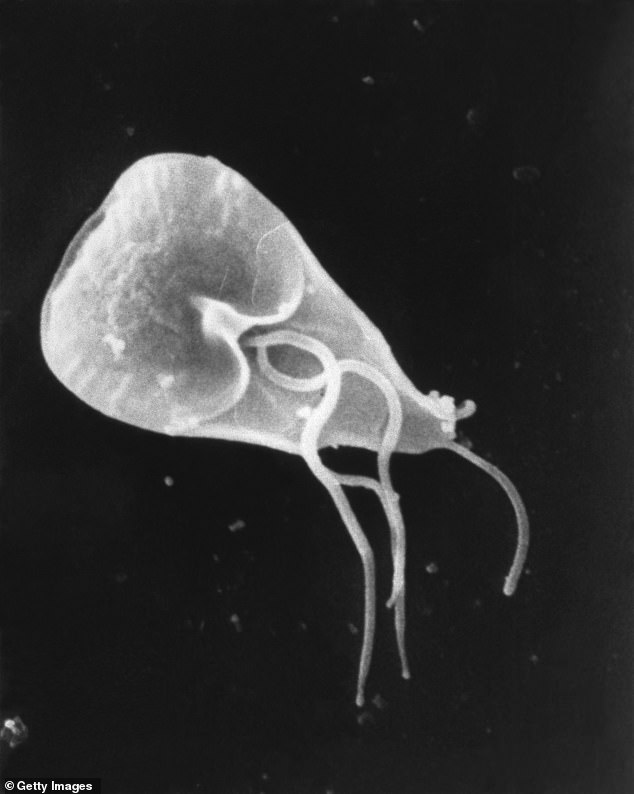Two children attending a special needs school in Liverpool who were battling an outbreak of giardiasis, a disease caused by a parasite, have died.
The names of the deceased and the exact cause of death have not been revealed.
However, health officials have said the deaths are “unlikely due to Giardia” despite the ongoing outbreak.
A spokesperson for the UK’s Health Security Agency said: ‘The UK Health Security Agency is aware of the sad deaths of two children attending Millstead Primary School and our thoughts are with the family, friends and school community.
“The deaths are unlikely to be due to giardia, which typically causes a self-limiting gastrointestinal illness that can spread easily in homes and school settings.”
Emma Savage, Health Protection Consultant from our Cheshire and Merseyside Health Protection Team, added: “Investigations are ongoing and we have provided information and advice to the school and parents. Public health measures are in place to help prevent further cases.”
Here MailOnline explains the signs of infection, how long it lasts, what to do if you or your child are infected and how to prevent it in the first place.
The school is currently dealing with an outbreak of the stomach bacteria Giardia, which is caused by the parasite Giardia lamblia. Pictured: A photomicrograph of a Giardia lamblia parasite
What is giardiasis?
Giardiasis is the name given to a gastrointestinal illness caused by a small parasite called giardia lamblia.
Giardia lamblia infects people through the digestive tract, from where it passes into the body’s small intestine, where it causes the disease giardiasis.
There are around 4,000 cases of giardiasis each year in the UK.
However, the actual number may be higher as people suffering from the disease may not seek medical help and therefore cases may not be recorded.
What are the symptoms and when do they appear?
The main symptoms of giardiasis are foul-smelling diarrhea that strikes two to five times a day and makes sufferers feel increasingly fatigued.
Other common symptoms include stomach pain or cramps, eggy-smelling burps, bloating, nausea, smelly, greasy or floating stools, and weight loss.
Diarrhea can also lead to dehydration, which can cause other symptoms or exacerbate existing ones.
Less common symptoms include fever, itchy skin or rash, swollen eyes, and swollen joints.
Symptoms usually begin one to two weeks after a person has ingested giardia lamblia, during which time the parasite begins to reproduce until it reaches numbers high enough to trigger giardiasis.
However, experts estimate that between 5 and 15 percent of people infected with giardia lamblia will not experience symptoms of giardiasis.
While this may seem positive for these people, they are capable of unknowingly spreading the infection to others, risking more cases.
How long do people stay sick?
Once symptoms appear, giardiasis usually lasts two to six weeks without treatment.
However, people with weakened immune systems, such as those undergoing cancer treatment, may be sick for longer.
Treatment can usually reduce the length of time people are sick with giardiasis to about a week.

The two boys attended Millstead Primary School in Everton, Merseyside, before their deaths.

Michelle Beard, principal of Millstead Primary School, said the community was “devastated” by the children’s deaths.
What are the main ways people can become infected with giardia lamblia?
Giardia lamblia is transmitted through contact with infected feces from people and animals that harbor the parasite.
This commonly occurs through contaminated food or water supplies.
This contamination can occur by drinking or swimming in water sources contaminated with human or animal waste.
London-based consultant gastroenterologist Dr Aathavan Loganayagam said: “Once inside their host, the microscopic cysts multiply rapidly. An infected person can pass millions of cysts a day in their faeces.”
Infection can also occur through food contamination, for example, when washing vegetables with contaminated water or when a person with giardiasis prepares meals.
The parasite can also be transmitted by direct contact with an infected person, such as a parent caring for a sick child.
Dr Loganayagam also said people can become infected through indirect contact, for example by “touching contaminated surfaces such as bathroom faucets or door handles.”
Finally, Giardia lamblia can also be transmitted through sexual contact, especially through unprotected anal and oral sex.
How is it diagnosed and treated?
GPs who suspect a patient has giardiasis will ask the patient to submit a stool sample which will then be sent to a specialist laboratory to be tested for traces of giardia lamblia.
If infection is confirmed, patients are usually prescribed antibiotics to help their body fight the infection.
Patients are also told to make sure they drink enough fluids, as the diarrhea it causes can lead to dehydration.
Sometimes doctors also advise people living with a patient with confirmed giardiasis to also get tested and take medication even if they have no symptoms.

